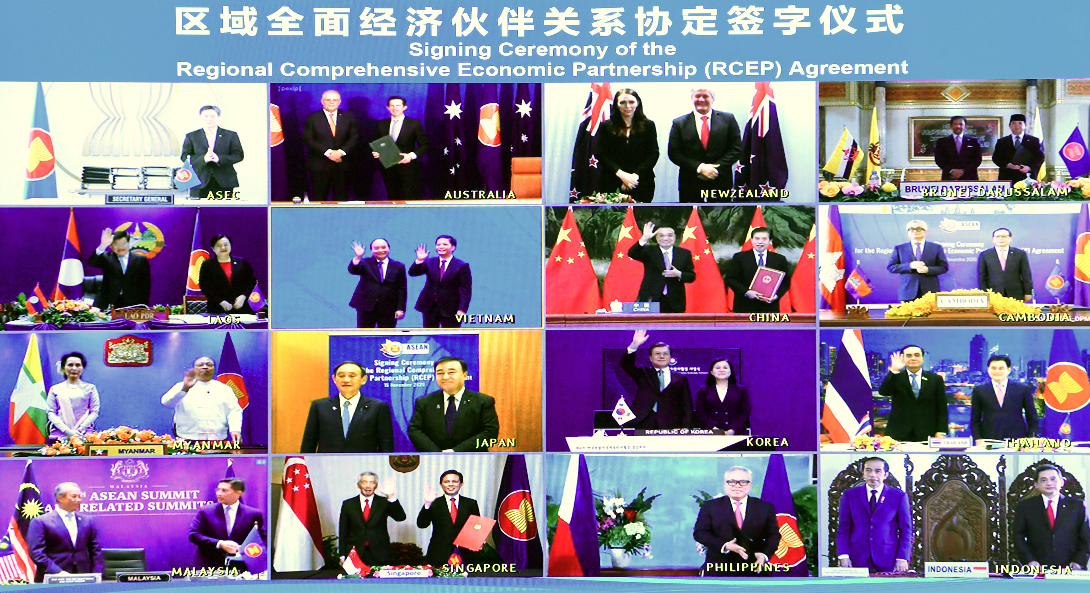by Mao Pengfei, Nguon Sovan
PHNOM PENH, Nov. 15 (Xinhua) -- The signing of the Regional Comprehensive Economic Partnership (RCEP) free trade agreement is a boon not only for the Asia, but also for the rest of the world, Cambodian academics said.
Leaders of 15 RCEP participating countries signed the long-awaited free trade agreement (FTA) at the fourth RCEP summit on Sunday during the 37th ASEAN virtual summit.
Initiated by the Association of Southeast Asian Nations (ASEAN) in 2012, the RCEP is a mega-trade pact between its 10 member states (Brunei, Cambodia, Indonesia, Laos, Malaysia, Myanmar, the Philippines, Singapore, Thailand and Vietnam) and its FTA partners, namely China, Japan, South Korea, Australia, and New Zealand.
Mey Kalyan, senior advisor to the Supreme National Economic Council, said the agreement would have great importance when global economy is losing out its balance due to the pandemic, protectionism and unilateralism.
"At the time when COVID-19 is still threatening our lives in the region and in the world, signing this RCEP is one of the epoch-making events in Asia, which will have good impact not only in Asia, but also in the world," he told Xinhua.
"As a Cambodian citizen, I'm happy about it and congratulate ASEAN and Asia on strengthening their collaboration, and I believe that the RCEP agreement will drive the region's growth in the post-COVID-19 era," he said.
Kalyan, who is also chairman of the Cambodia Development Resource Institute, said the agreement would provide a long-term benefit to all participating countries including Cambodia.
He said as the world is being hit hard by the COVID-19 pandemic, China would be a very important force to pull out the Asian economy from this difficult time, saying that China's economy is huge and less impacted by the pandemic.
The 15 participating countries of the RCEP now account for about 30 percent of the global population, as well as nearly 30 percent of world's gross domestic product (GDP) and global trade.
Neak Chandarith, director of the Cambodia 21st Century Maritime Silk Road Research Center, said the signing of the RCEP agreement is a planned deliberation, but its significance and urgency are fueled by the rising trade uncertainty caused by COVID-19 and protectionism.
"The deal signals their pledge of the concerted upholding of multilateralism in trade, and compensates their severe economic loss suffered from the two crises," he told Xinhua.
He said the RCEP deal applied a wide range of sectors at once, from trade in goods, trade in service, investment, trade facilitation, sanitary and phytosanitary measures, technical barriers to trade, e-commerce, rule of origin, and dispute settlement to intellectual property.
"The RCEP is more liberalized than ASEAN+1 FTAs and the WTO's most-favored-nation (MFN) commitments," the director said.
For Cambodia, the trade agreement is the first-ever trade deal that enables the kingdom to enjoy an almost-free market access to a combined market, he said.
"Cambodia's trade in goods increases while more investment inflows are imported when the deal comes into force," he said. "Moreover, Cambodia expects that the RCEP promotes its bargaining power in other bilateral FTAs with RCEP or non-RCEP members."
Chandarith said the RCEP would promote trade and attract investments to all participants in ASEAN indeed, but the extent to which each participant could enjoy varies.
"The RCEP will bring new opportunities regarding e-commerce and trade facilitation, among others," he said.
Joseph Matthews, senior professor at the BELTEI International University in Phnom Penh, said the mega trade deal would definitely play an important and positive role in promoting trade and investment in Asia-Pacific countries and helping boost global economic confidence.
"As global multilateral trading system is facing difficulties, I strongly believe that the RCEP pact will be conducive to maintaining the multilateral trading system, promoting deep integration of the global industrial chain, and playing the role of a driving force in building an open world trading system," he told Xinhua.
"It will also bring about a new situation in our global trading system, which will ultimately undermine the negative forces of protectionism and unilateralism in the global markets," he said.
He said the RCEP would be a major force shaping the development of the world's economy in the post-COVID-19 era.
"It will be able to build a sanctuary for free trade and investment cooperation against the forces of protectionism elsewhere in the world," he said. "With the RCEP framework is in place, I believe the trade and investment, and development of economies in the region will be further enhanced in the post-pandemic era."
Speaking of China's presence in the RCEP agreement, Matthews said China would continue to maintain an open attitude in the process of globalization, actively advocate RCEP cooperation, and contribute to global economic growth.
"China's Belt and Road Initiative will bring a new impetus to the regional and global building through new infrastructure and enhancing connectivity in the region and world," he said. "China will remain a source of economic drive and an invincible force of region and world development for many decades to come." Enditem




 A single purchase
A single purchase









